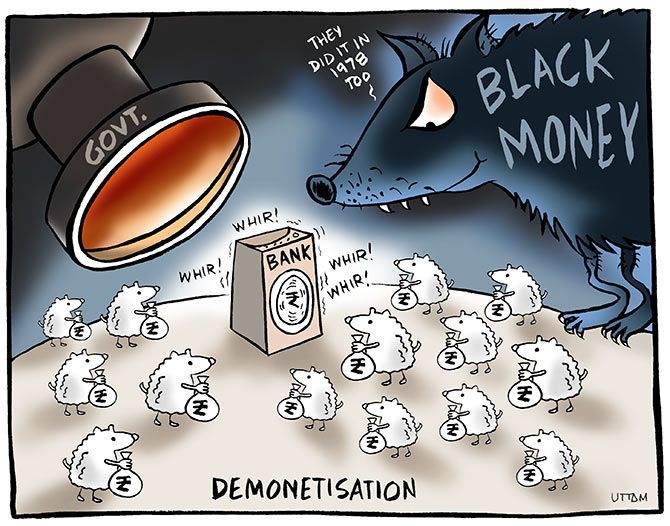States sent queries for research to NIPFP in Feb-March; Work on research started around July, reveal Nitin Sethi and Ishan Bakshi.
Illustration: Uttam Ghosh/Rediff.com
 Months before demonetisation, in February-March, the Madhya Pradesh and Haryana state governments had approached the National Institute of Public Finance and Policy (NIPFP) to evaluate Pune-based NGO ArthaKranti's proposals, which include the withdrawal of high-denomination notes.
Months before demonetisation, in February-March, the Madhya Pradesh and Haryana state governments had approached the National Institute of Public Finance and Policy (NIPFP) to evaluate Pune-based NGO ArthaKranti's proposals, which include the withdrawal of high-denomination notes.
The initial queries for conducting the research from the two Bharatiya Janata Party state governments went to NIPFP around February and March. Work on the research formally commenced around July.
But the complete report on the evaluation of the proposals was not submitted to the state governments by the time the Union government announced the demonetisation on November 8.
NIPFP did put out a working paper in the public domain on November 14 discussing the impacts of demonetisation.
NIPFP is a New Delhi-based think-tank set up as an autonomous society, at the joint initiative of the Union ministry of finance, the erstwhile Planning Commission, several state governments and academics.
The Madhya Pradesh government responded to Business Standard queries saying that it asked NIPFP to carry out an 'Assessment of proposals outlined in the document Exploring ArthaKranti — A path to Fiscal Consolidation.'
When asked what prompted the state government to request NIPFP to carry out the research, the government replied, 'ArthaKranti Pratishtan, Maharastra knowledge Corporation Limited had prepared a report for exploring ArthaKranti-A path to Fiscal Consolidation in 2013. The commercial tax department of the government of Madhya Pradesh felt that this report needs to be examined further since the report focuses on a substitute alignment of the system of laying and levying taxes.'
'Hence, a more in-depth analysis by NIPFP would be in order,' the MP government added. 'In the context above the state government has executed an agreement with NIPFP to conduct an assessment of the proposal outlined in the document.'
Under the Reserve Bank of India Act, 1934, state governments have no role or power in either withdrawal of currency or demonetisation by any route.
The Acts provision 26 (2) reads, 'On recommendation of the Central Board the Central Government may, by notification in the Gazette of India, declare that, with effect from such date as may be specified in the notification, any series of bank notes of any denomination shall cease to be legal tender.'
The central government has repeatedly mentioned that the entire exercise running up to the announcement of demonetisation on November 8 had been conducted in secrecy.
Business Standard also sent detailed queries to NIPFP as well as the chief minister of Haryana. Neither responded.
ArthaKranti has claimed credit for introducing the idea of demonetisation to the BJP leadership even before Prime Minister Narendra Modi took over the reins at the Centre.
The NGO's head, Anil Bokil, has spoken of repeatedly meeting several top BJP leaders on the issue.
Speaking to Business Standard, Bokil said, "The report is in the final stages. Madhya Pradesh and Haryana had recommended NIPFP to study our proposals. I have personally not met people from NIPFP directly but other directors are in regular touch."
On being asked if the proposal had been commissioned to NIPFP by state finance ministries or chief ministers, Bokil said, "It went from the chief ministers."
Haryana Finance Minister Captain Abhimanyu said, "I have not come across such a proposal. but I wouldn't know if such a proposal had gone from the chief minister’s office."
ArthaKranti's proposals listed on its Web site include the withdrawal of existing taxation system, introducing a banking transaction tax, withdrawal of high-denomination currency, legal restrictions to restrict cash transactions up to a certain limit.
Bokil has noted that the government has not followed all the steps his NGO had recommended, but undertaken only one part of it -- the withdrawal of high-denomination notes as yet.
A reference in public to the possibility of demonetisation had also come as early as March 2016 from the chief economic advisor of the State Bank of India, Soumya Kanti Ghosh.
Ghosh wrote in Business Standard on March 23, stating, 'If we were to draw a link between such a surge in production and the usage of cash, it is possible that demonetisation might have begun even before the government had withdrawn high-value notes from circulation (according to unconfirmed reports, higher currency denomination notes may be discontinued in the near future so as to tackle the menace of unaccounted money).'
The article was followed up by a formal report from SBI (Ecowrap) that Ghosh authored in April, stating, 'There are suggestions in the public domain and even analysis that are suggesting that higher denomination notes may be replaced. We believe, as a result of that people may be using more of high value currency to purchase safe haven assets.'
While more details of NIPFP's report to states are not known, the working paper it put out after November 8 concludes, 'While it has been argued that the cash that would be extinguished would be "black money" and hence, should be rightfully extinguished to set right the perverse incentive structure in the economy, this argument is based on impressions rather than facts.'
Sources in NIPFP said a working paper does not represent the views of the institution, but that of the authors.











